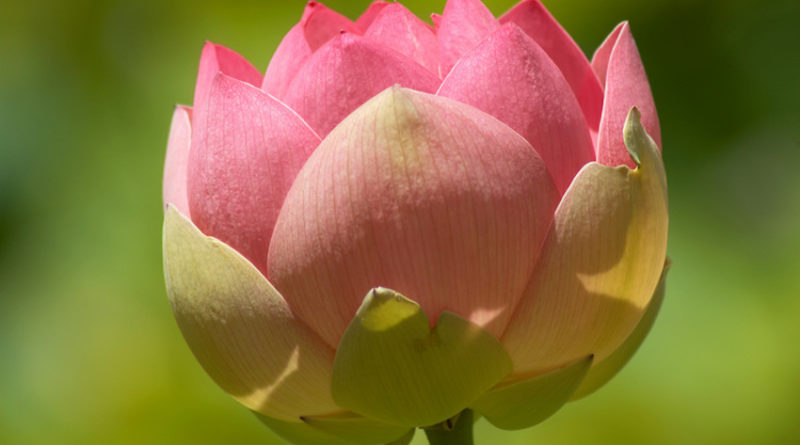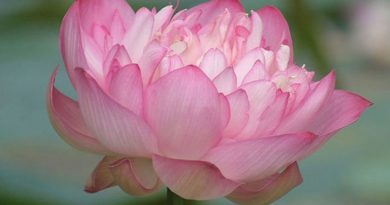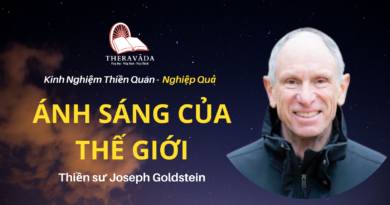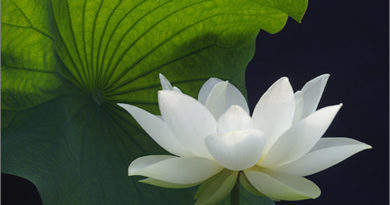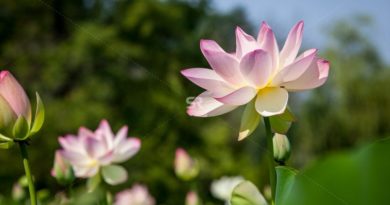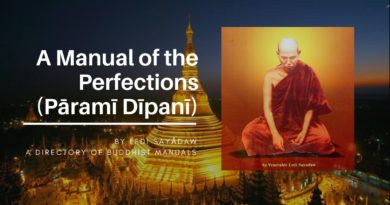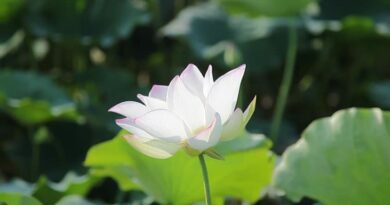DHAMMA PADETHA – 31. NOBLE KATHINA ROBE OFFERING, BUT ONCE A YEAR
DHAMMA PADETHA – NOBLE KATHINA ROBE OFFERING, BUT ONCE A YEAR
Buddhists take great interest in Kathina Robe offering ceremonies. All family members take part in these ceremonies. The donors of Kathina robes welcome the guests joyously and feed them with specially prepared delicious food. The guests also consume them merrily at the ceremony. They also listen to the Kathina sermon together with the donors. They believe that offering Kathina robes is highly beneficial since it is done but once a year.
“Robes for Kathina and monastery for an ordination hall (sima) are the noblest offers”, goes the saying.
Things that should be known regarding Kathina.
(1) The meaning of the word Kathina
(2) What holding the ceremony means
(3) Why Kathina is held
(4) The benefit of holding Kathina ceremony
(5) Why Kathina offering is noble
These are the five things that should be known
(1) The meaning of the word Kathina
The word Kathina has come from the Pali word ‘Kathina’. The Pali word kathina means permanence. Among permanent things, the time and the benefit are permanent. Thus kathina means the time as well as the benefit are permanent.
How the time is permanent
Kathina ceremony is held only during the time Lord Buddha had allotted. It must be held within one month from the 1st waning day of Thadingyut (Assayuja) to the full-moon day of Tazaungmon (Kattika).
The Kathina ceremony cannot be shifted to other months like Nattaw (Magasira), Pyatho (Phussa), Tabodwe (Magha) and other months. That is why the time for holding Kathina ceremony is permanent.
Motto: The time cannot be shifted,
kathina ceremony is permanent.
How the benefit is permanent
Lord Buddha had granted that the five benefits be permanent for the monks residing (rising from Purimavassa) at the monastery where Kathina is held, beginning from the first waning day of Thadingyut up to the Full-moon Day of Tabaung (Phagguna), altogether five months. The benefit does not shift to other months. That is why the benefit of Kathina is permanent.
Motto: The benefit does not shift,
permanent is Kathina offering.
(2) What holding the ceremony means
Holding the ceremony is to increase the benefit Monks residing at the monastery where Kathina is not held, get the benefit of Kathina just for one month from the first waning day of Thadingyut to the Full-moon Day of Tazaungmon. Those monks residing at the monastery where Kathina ceremony is held get the benefit from one month to five months. Hence, the benefit is increased.
Motto: The benefit of one month,
extended to five months
For Example When you spread a five-folded carpet when visitors come to your house, the carpet expands five times. Thus when dayakas and dayikas donate kathina robes and the sangha hold the Kathina ceremony by the ecclesiastical act (vinaya kamma), the benefit spreads and increases from one month, from the first waning day of Thadingyut to the full-moon day of Tazaungmon, to five months, up to the full-moon day of Tabaung. Thus the five benefits of Kathina is extended from one month to five months.
The robes that have been offered to the sayadaws and sangha are arranged according to vinaya kamma so as to get benefits from one month to five months and this is known as holding Kathina ceremony.
(3) Why Kathina is held
The reason why Kathina ceremony is held: During the lifetime of Lord Buddha thirty monks from Paveyyaka who came to pay homage to the Buddha were exhausted, with their robes soaked with rain. Hence Lord Buddha gave permission to hold Kathina ceremony.
The story of the thirty Paveyyaka citizens who became monks is as follows: One year after the enligthenment, Lord Buddha went into the Uruvela forest and while staying under a tree, thirty bhaddavaggi princes came into the forest with their wives to enjoy themselves. While they were merry-making, a hired wife stole the valuables of a prince and ran away. The thirty princes while looking for the woman saw Lord Buddha. They told the Lord that they were looking for a woman who had been lost.
Lord Buddha asked them, ‘Princes, which is more profitable, looking for the woman or searching yourselves? The princes whose parami was mature, answered: ‘Searching ourselves is more profitable’. Then Lord Buddha said, ‘if searching yourselves is more profitable I will give you a discourse.’ At the end of the discourse the thirty princes became sotapanna. Lord Buddha uttered “Ehibhikkhu” and they all became monks.
These thirty monks practised living in the forest (arannakanga dhutanga), going for alms (pindapatikanga dhutanga), wearing parched robe (pansukulikanga dhutanga), wearing only three robes (tecivarikanga dhutanga). These thirty monks stayed (thirteen) whole years in the forest at the end of which yearning to pay homage to the Lord Buddha started on their journey to Savatthi where the Lord was residing. Since the distance was too far they had to spend the vassa at Saketa, a town six yojana (one yojana=l2 miles) away from Savatthi.
As soon as vassa was over, they did commemorate the termination of vassa (pavarana) and continued their journey towards Savatthi where the Lord Buddha was. Since it rained heavily on their way their robes were soaked and soiled with mud and very uncomfortably arrived at the place where Lord Buddha was staying, who asked, ‘My disciples, are you all well and happy?’, in the form of greeting. Later, because the thirty monks who had come from a great distance were exhausted and uncomfortable with wet robes, gave permission to hold kathina ceremony. Ever since and up to this day permission is given to hold kathina ceremony.
(4) The benefit of holding Kathina ceremony
The benefits of holding kathina ceremony: When the monks hold kathina ceremony with the robes offered by the dayakas and dayikas, by the act of vinaya kamma, the monks get five Kathina benefits from the first waning day of Thadingyut to the Full-moon Day of Tabaung for five months. The laity also reap five benefits similar to that of the monks.
(1) Anamantacara. When invited for alms-food, going away without reporting to the residing monk does not commit any offence.
Motto: Going where one wishes without reporting
commits no offence.
The donors of Kathina robes could go freely wherever they wish to without any hindrance in every existence.
Motto: Without any hindrance could go freely wherever one wishes.
(2) Asamadanacara—Out of the three Ticivara robes on which have been made resolution according to vinaya, one robe can be kept anywhere and the monk can go about without committing any offence.
Motto: One out of the three robes, keep one any where and can go about as one wishes.
The donors of Kathina robes, devotees may go to any place to carry out their tasks. They will be done easily and lightly without having to bear any burden in every existence.
Motto: Task and duty are not heavy but carried out lightly.
(3) Ganabhojana – If four or more monks are invited to eat rice, curry and other foods inappropriately or unproperly using the language of the laity, the monk can go and eat without committing any offence.
Motto: Four together the same order if wishing to eat together, may do so.
The donors of Kathina robes, in every existence may eat any kind of nutrition/food but will not have stomach trouble, diarrhoea, food poison or other dangers. They get the benefit of easily digesting whatever is eaten.
Motto:- Eating what one wishes will cause no trouble.
(4) Yavadattacivara- Several robes may be kept by without making resolution and apportioning from the first waning day of Thadingyut (Asayuja) to the full-moon day of Tabaung (Phagguna) up to five months without committing any offence or apatti. This is the benefit the monks get.
Motto: Keeping lots of robes for five months, will cause no offence.
The donors of Kathina robes, in every existence, may keep by diamonds, gold, silver, rubies, lots of jewels without having enemies.
Motto: Keeping lots of property have no danger.
(5) Yocatatthacivaruppada- Though robes are offered for all the sangha, only those from the monastery for whom the originally kathina ceremony was held have the benefit of being entitled to own the robes. Monks from other monastery although they are staying in the monastery after the kathina ceremony are not entitled.
Motto: Robes offered to sangha, only those staying formerly at the monastery are entitled.
The property of the donors of Kathina robes cannot be taken away by force. If they do not wish to give away their property, nobody with any power can take by force. They get the benefit of making other people get it only when they give.
Motto: Your own property is not taken away by anybody by force.
Offering Kathina robes is excellent, in that, the monks, when needing robes, are allowed to ask from the parents and relatives with the exception of Kathina robes. They can also ask from people who have invited them to ask when they need robes, whereas kathina robes cannot be asked from either parents, relatives or those who have invited. As though the robes have fallen from the skies Kathina robes have been offered automatically due to the saddha of the donors, and the kathina ceremony is held. The robes are noble as they are being cleanly received, entirely without being asked for. It shall be said that they are noble.
When monks accept the 4 requisites other than Kathina robes from donors, who have saddha, Lord Buddha said, “O Bhikkhus, without observing sila or vinaya rules, wearing the robes offered by people means more suffering than wearing a hot sheet of iron, burning with flames; eating alms-food has more suffering than eating hot pieces of iron burning with flames and staying in the monastery has more suffering than staying in an iron trap burning with flames.” Thus the Lord Buddha admonished the monks.
(5) Why Kathina offering is noble
When the monks accept the offering of Kathina robes Lord Buddha praised them “O Bhikkhus, accept the Kathina robes that are being offered and may you get the five benefits from one to five months. That is why Kathina robe offering is an excellent offering.
Moreover, Kathina robe offering is done but once a year, only within one month in a year and it must be finished within one day in that month. That is why it is most noble and pure.

